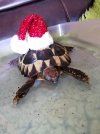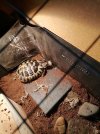AjDaVinci
New Member
Hi, we have been struggling with helping our tortoise gain weight for about a year now. We brought him to the vet for critical care, injections, tube feeding etc. We now inject him ourselves twice a week because we have to stop him from hibernating as he is too thin to hibernate.
Vet says his husbandry is excellent and it could be something physiologically wrong with his digestion / bad breeder / bad start in life. He is now 8.
Next year he HAS to hibernate as the vet believes it could affect his thyroid if he doesn't.
He tries to hibernate as soon as October hits, even if his tank conditions don't change with the seasons. So, we are going to bite the bullet and hibernate him next year.
So, what's the best way to make a Hermann's gain weight without too much protein in the diet. I live in Ireland and I am very into foraging or gardening so anything in my region I can forage/ grow is fair game.
He is currently 820g, very small for his age, but believe it or not he is gaining weight. Once his appetite picks up again in spring/ summer what should I feed him to bulk him up for Winter?
Vet says his husbandry is excellent and it could be something physiologically wrong with his digestion / bad breeder / bad start in life. He is now 8.
Next year he HAS to hibernate as the vet believes it could affect his thyroid if he doesn't.
He tries to hibernate as soon as October hits, even if his tank conditions don't change with the seasons. So, we are going to bite the bullet and hibernate him next year.
So, what's the best way to make a Hermann's gain weight without too much protein in the diet. I live in Ireland and I am very into foraging or gardening so anything in my region I can forage/ grow is fair game.
He is currently 820g, very small for his age, but believe it or not he is gaining weight. Once his appetite picks up again in spring/ summer what should I feed him to bulk him up for Winter?



